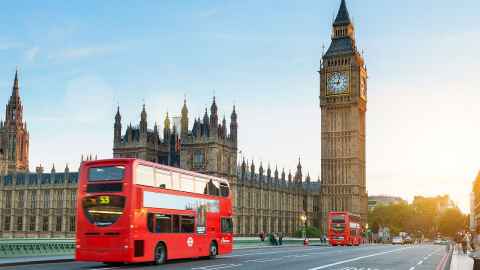The Brexit bus just blew a gasket
5 September 2019
Opinion: Neal Curtis explains the blow to Boris Johnson of the vote in the UK Parliament against his determination to lead the country into a no-deal Brexit.

Tuesday saw a tweet from Harper Collins announcing a new autobiography from David Cameron, to which someone replied: “will the book be spineless, too”? The next day the UK government, led by Boris Johnson, was defeated 328 votes to 301 in a historic decision by parliament to take back control from an executive seemingly willing to drive the country off the cliff of a No Deal Brexit.
To understand what has happened, though, we need to go back to Cameron’s decision to hold a referendum on membership of the European Union, an issue that itself has a long history of Conservative Party rancour, beholden as a large section of that party is to a little Englander mentality and fantasies of former empire, coupled with visions of the EU as a regulatory behemoth hindering their God-given freedom.
Cameron went into the referendum debate with his hands tied. Six years of austerity had already put incredible pressure on the UK population. As the neoliberal dogma he supported passed ever more risk on to working people and their families while dramatically widening the gap between rich and poor, he had limited options. As the architect of austerity (a defunct economic theory but a favourite for those looking to protect their own wealth in times of crisis) he had no way of talking to the British people about why their anxieties might not be solely down to the EU, and might instead have something to do with the politics of his government.
As a means of distraction after the Financial Crisis of 2008, politicians returned to the reliable tactic of blaming foreigners and migrants for all the UK’s troubles. They had also executed an incredible sleight of hand by converting a crisis in the financial sector into a sovereign debt crisis. From the failure and greed of bankers the rhetoric quickly shifted to an inability to afford welfare and public services. The poor and those on benefits were also lined up for vitriolic condemnation.
So, before the referendum started, the leader of Remain was hamstrung. In an attempt to distract from the politics of austerity and defend the Conservative Party from Nigel Farage’s UKIP he had already given Leave a head start by emboldening and legitimating the xenophobes, racists and ethno-nationalists. From the moment the referendum was announced the UK government had effectively become a de facto UKIP government.
Boris Johnson quickly saw a chance to take personal political advantage and switched sides to be the vocal frontman of the Leave campaign, quickly energising the mosh pit of headbangers in the country’s predominantly right-wing press and a BBC (at least its politics division) replete with Oxbridge compatriots and former Murdoch employees.
The Remain campaign was so bad it is as if it didn’t exist, while the Leave campaign was full of nationalist bombast, populist misdirection, imperial zeal, and buses; buses that carried huge lies on the side of them. On top of the mendacity that was Leave’s lifeblood it was also mired in the scandal of corruption, specifically the Cambridge Analytica affair.
As a consequence, the Leave campaign was judged to have acted illegally in its practice; but get this, if the referendum had been legally binding it could have been rendered void as a result of this illegality. However, as a non-binding referendum it was not.
Despite this, the UK government ploughed ahead with talk of defending the vote as a defence of democracy. In other words, democracy was now about the enforcement of a non-binding plebiscite narrowly resulting in a vote to leave the EU via a campaign based on lies, disinformation and illegal activity.
Over the last three years, the push for Brexit has involved the further ratcheting up of anti-foreigner, anti-migrant rhetoric. This has led to a resurgence of far-right activity in the UK and the creation of Farage’s new political vehicle, the Brexit Party. As Theresa May failed to get a deal passed, the slender victory has been turned into a supposed mandate for what would be a catastrophic no-deal (never an option during the referendum) that would primarily benefit the disaster capitalists in the Conservative Party and those who want to align themselves with the neo-nationalism of Donald Trump and the Alt-Right.
Labour Party leader Jeremy Corbyn and the Tory MPs that put country over party have just landed a significant blow to that project, and in perhaps the most ironic of twists the vote has seen the grandson of Winston Churchill expelled from the Conservative Party.
Dr Neal Curtis is Associate Professor of Media and Communication in the Faculty of Arts.
This article reflects the opinion of the author and not necessarily the views of the University of Auckland.
Used with permission from Newsroom The Brexit bus just blew a gasket on 5 September 2019.
Media queries
Alison Sims | Research Communications Editor
DDI 09 923 4953
Mob 021 249 0089
Email alison.sims@auckland.ac.nz